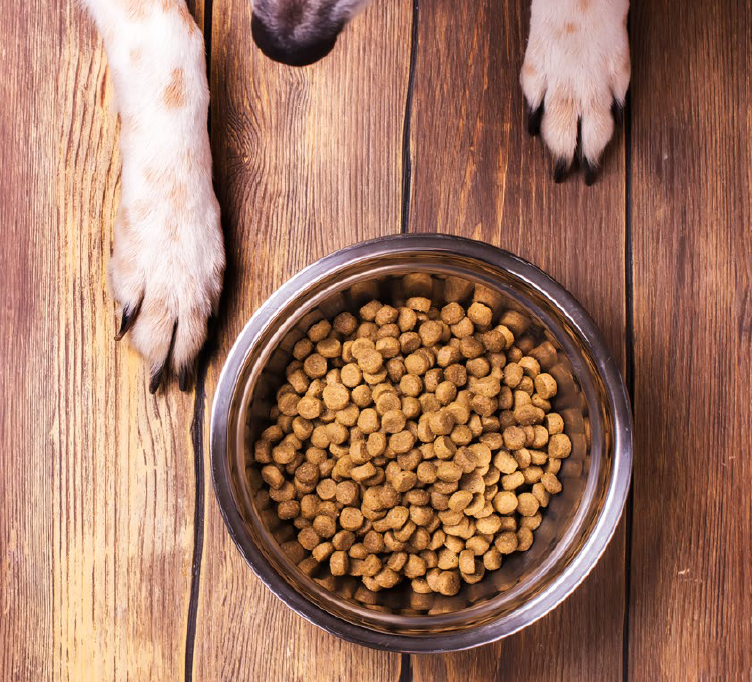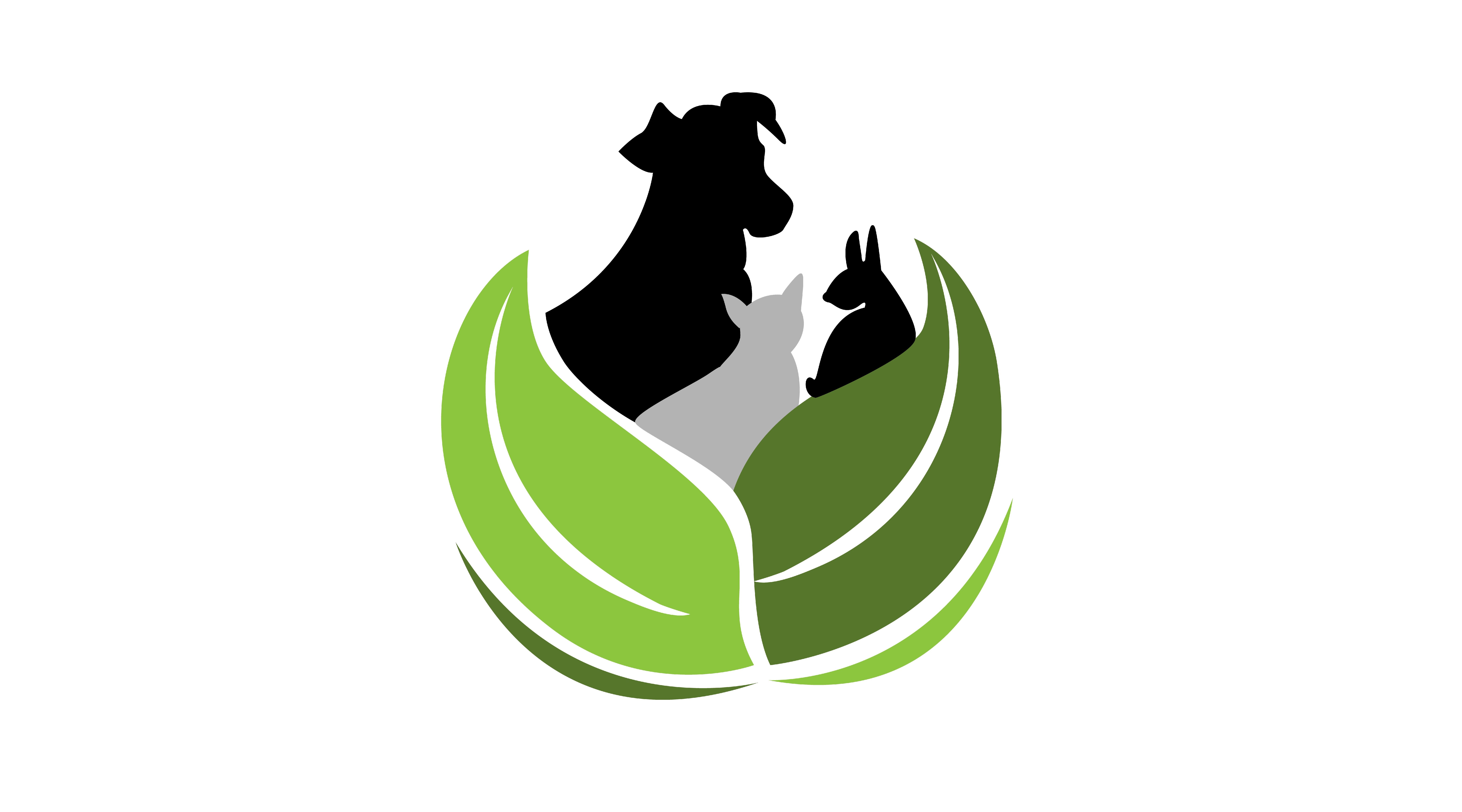Feeding with a Purpose
Colleen Murphy //October 25, 2017//
We all know the importance of dog food: it is the fuel a dog needs to survive. But food can be so much more than just the source of the required daily caloric intake. Manufacturers are working with scientists and vets to develop formulas and diets that benefit dogs in more ways than one.
Dog food can help manage weight, aid in maintaining a healthy coat and skin, restore energy… The list of ways chow can assist a dog in living a healthy life is long, and consumers have realized this, with many owners seeking foods that promise to lend a hand in whichever area a dog needs. In fact, according to the American Pet Products Association’s (APPA) 2017-2018 APPA National Pet Owners Survey, premium dog food has been the predominant choice for dog owners for the past decade, with 41 percent of dog owners having purchased it in 2016. There has also been a big jump in the number of grain-free/gluten-free formulas being bought. In 2016, 19 percent of dog owners purchased this type of diet, compared to 11 percent in 2014. Organic and natural food, as well as food made with prebiotics and probiotics, are also up in sales.
Today, owners are feeding with a purpose.
Food Sensitivities
According to WebMD Pet, 10 percent of all allergy cases in dogs are food-related. Dogs that are allergic to a certain type of food ingredient can develop different symptoms, such as a rash, hives, diarrhea, chronic gas or inflamed ears. And just like there is no dog breed that is truly allergen-free for humans who are allergic to dogs, there is no food that is truly allergen-free for dogs.
Instead, manufacturers are creating dog food that caters to dogs’ food sensitivities—either allergies or intolerances—by offering different types of diets. For example, more companies now have products that limit the number of ingredients in the recipe, thus decreasing the chances that a dog would have an allergic reaction or intolerance to the food. These limited ingredient diets (LID) have become more popular over the years as more dogs have been diagnosed with food allergies.
According to the APPA National Pet Ownership Survey, 12 percent of dog owners have purchased an LID dog food within the past year.
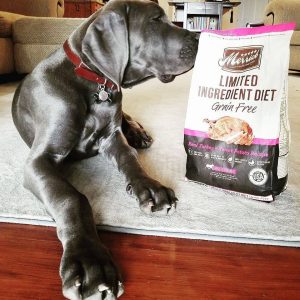
Merrick introduced its Limited Ingredient Diet line in 2015 in order “to provide an option for pet parents seeking the simplicity of diets limited in proteins, ingredients and grains,” said Pete Brace, vice president of communications and pet parent relations for Merrick Pet Care.
The grain-free, easily digestible formula offers complete and balanced nutrition from the fewest, most essential ingredients, including a single source of animal protein, in both kibble and canned recipes, according to Brace. The LID formulas feature “a selection of the on-trend proteins pet parents are seeking today, including chicken, lamb, salmon, duck or turkey.”
Petcurean has an entire solutions-based brand with its GO! food. The brand is full of variety—fresh meats, meat meals, grains and grain-free, for example—in order to have recipes for different issues, according to Dr. Jennifer Adolphe, PhD, RD senior nutritionist for Petcurean. GO! has three lines, each focusing on a specific need.
The first, Fit and Free, is a high-protein diet, especially useful for working dogs who need more proteins and fats. The second, Daily Defense, is nutrient-dense and for whole body preventative care. It is the third, Sensitivity and Shine, which a dog with food sensitivities or specific dietary needs might find particularly beneficial.
Sensitivity and Shine “are all life stage recipes that have limited number of ingredients to support animals that have experienced adverse food reactions,” Dr. Adolphe said.
According to the Petcurean website, the recipes are “carefully prepared with select meat proteins, unique carbs and essential omega oils.”
It is within this line that the novel proteins of duck, salmon, venison, turkey and, newly, pollock and lamb can be found. Novel proteins, states Dr. Adolphe, are “primarily beneficial for pets who are experiencing adverse food reactions.”
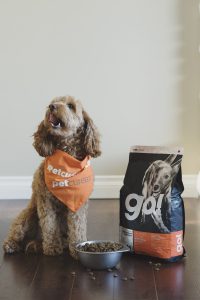 “A pet is less likely to experience an adverse food reaction to a novel ingredient,” Dr. Adolphe explained. “If they haven’t been fed that ingredient before, then they are less likely to react negatively to it, and it is the protein component in the food that is typically the cause of the adverse food reaction. So the novel proteins are ingredients that are not common in the pet food supply, and so the animal is less likely to have been exposed to it and will hopefully tolerate it better than the more common ingredients, such as chicken for example.”
“A pet is less likely to experience an adverse food reaction to a novel ingredient,” Dr. Adolphe explained. “If they haven’t been fed that ingredient before, then they are less likely to react negatively to it, and it is the protein component in the food that is typically the cause of the adverse food reaction. So the novel proteins are ingredients that are not common in the pet food supply, and so the animal is less likely to have been exposed to it and will hopefully tolerate it better than the more common ingredients, such as chicken for example.”
Petcurean has novel proteins available in both kibble and as a pâte. CANIDAE has also tapped into the novel protein sector. According to the company’s website, CANIDAE offers 12 different protein sources, such as bison and wild boar, in its dog food. According to CANIDAE, it is important for the company to offer a variety of quality protein sources so consumers can find the product that fits best for their pet.
Specialty holistic store The Animal Kingdom has always had customers with food-sensitive dogs. In recent years, however, there has been “an increase in the amount and severity of health sensitivities in our pets,” according to the store’s owner, Julie Bartoldson.
“Our goal is to work with the pet parent to find potential sources of irritants (environmental, nutritional or behavioral), eliminate or modify those that can be and build the pet’s health back,” she said. “At the center of our effort, we focus on the digestive and immune systems with the belief that proper nutrition and supplemental supports will enable and strengthen the pet’s natural ability to heal itself.”
The Orchard Park, New York-based store focuses on diets that are limited ingredient, contain high quality ingredients and have appropriate and sometimes novel protein sources, according to Bartoldson. She lists such brands as Nature’s Variety LID, Pure Vita Grain Free, Carna4 oven baked and Grizzly Salmon Premium oven baked as brands that are popular with her customers who own pets with sensitivities requiring high quality kibble.
Prebiotics
Lucy Pet Products chose to focus on gut health when developing its Formulas for Life food, working with veterinarian Dr. George C. Fahey, a leader in gut health and dietary fiber, to do so.
“We all know that fiber is important because it promotes the movement of food through the digestive system and produces consistent stools,” the Lucy Pet Products website says. “However, new research shows that having a variety and blend of fiber sources carefully selected can produce an environment in the digestive tract to lead to an optimal balance in the gut.” 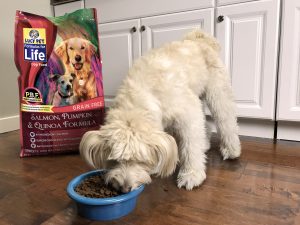
That’s why Dr. Fahey and the Lucy Pet team made Formulas for Life include Prebiotic Balanced Fiber (PBF), blended with ingredients like quinoa, pumpkin and chickpeas. According to Lucy Pet Products’ founder, Joey Herrick, Dr. Fahey and the Lucy Pet team analyzed probiotics in pet food and found by the time the food has sat in a hot warehouse and truck and then in the store before being bought and getting fed to the dog, there isn’t much live probiotic bacteria left to have a substantial effect on a dog’s digestive system. So, they found a way to accomplish the intended benefits of probiotics in dog food with prebiotics.
“When you take certain prebiotics in the correct ratios and put them together, then that actually gets down into the large intestines where it ferments, creates short-change fatty acids, and that actually feeds the natural probiotics that dogs and cats— and us, too—have in the system,” Herrick said.
But it’s not just digestion that the Formulas for Life line can better.
“It turns out there’s a lot of other benefits to the body from the right balance of bacteria in your gut, so gut health is really the future of health,” said Rick Rockhill, Lucy Pet’s executive vice president. “They say the gut is like your second brain because of what it can do. It does so much more than just digest food; it also syncs, makes decisions for the body… When your body is digesting properly, a lot of good things happen. Your organs all work synergistically.”
A healthy gut can be a preventative, Rockhill said.
For example, he notes that the short-change fatty acids the PBF produces help create a layer of protection around the colon and the digestive tract, protecting dogs from exposure to pathogens that could lead to leaky gut syndrome, which has been believed to lead to some cancers.
Besides having the potential to prevent diseases, Rockhill said owners have reported an increase in energy in their dogs. And while Formulas for Life is not a weight loss formula, Rockhill said the complex carbohydrates that take longer to break down allow dogs to feel satisfied for longer.
The Formulas for Life line offers three types of food for dogs: Duck, Pumpkin and Quinoa; Duck and Potato Limited Ingredient Diet; and Salmon, Pumpkin and Quinoa.
Going Vegan
Vegan dog food maker v-dog considers the lifestyle of not only the dog when making its food, but also the owner.
“The majority of our customers are vegans themselves. They’re bigtime animal lovers and they’re basically looking to an alternative to a traditional meat-based food so they can keep everything aligned with their ethics,” said Lindsay Rubin, v-dog manager of operations. “They don’t have to eat vegan themselves and then scoop out a meat-based food; we provide an option for these people and so they don’t have to compromise their ethics for their dog and in a way where they can feel really confident about the food.”
Instead of having a main meat ingredient as the protein source, v-dog uses peas and pea proteins, which are naturally high in protein, according to Rubin.
But dog owners who are vegan are not the only ones to make up v-dog’s customers. According to Rubin, more non-vegan owners are switching their dogs to the vegan diet to help with their sensitive stomachs or allergies.
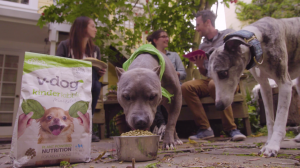
“We have a lot of people who say, ‘I’m not vegan myself, but what’s the opposite of what I’m doing?’ and they find us,” she explained.
Since v-dog’s start in 2005, Rubin said there has been “more and more buzz” about novel proteins like pea and other plant-based proteins, especially in the past couple of years. And while she says vegan dog food is a niche market that makes up only a fraction of the multibillion dollar pet food industry, it is chipping away at the market, continuing to grow.
One of the biggest humps the vegan dog food sector might have to overcome is the thinking that dogs need to eat meat since they are naturally carnivorous. But as Rubin says, v-dog likes to point out, dogs have been evolving alongside humans for thousands of years.
“Dogs are omnivores (not carnivores), and they’ve adapted to digest starches 28 times better than wolves,” the v-dog website explains. “Dogs can get all of their nutrients from vegan sources and are often healthier, leaner and more energetic when consuming plant-based food.”
“They have different genetic components than wolves… that allow them to actually digest and make use of starches significantly better than wolves. You can’t feed a wolf this type of diet because they can’t make use of the starches,” Rubin said.
Made in California with whole foods like peas, lentils, quinoa and brown rice, v-dog comes in a standard kibble size and a mini size for dogs with smaller mouths or chewing troubles. There are also two treats available.
The company’s site has a testimonial tab that shows what v-dog has helped with, including issues with mobility, stiffness, diabetes and allergies.
“We’re really excited at the prospect of helping more dogs. We’re all dog parents and vegans and total animal lovers,” Rubin said about the v-dog staff. “I see my dogs on it and how happy they are. They just go nuts for this stuff. Helping dogs, kind to the planet. I think the direction is definitely up. It’s definitely a long way to go, but we’re cutting time for sure.”
Petcurean’s Gather line, which is made with organic ingredients and is sustainably produced, has a vegan formula called Endless Valley.
According to Dr. Adolphe, it has become the most popular recipe in the line, performing better than the two meat-based options.
“I think that people are looking for options for feeding their pets, and vegan is another option that works great for some dogs. It’s an option that allows for people to feed their pets similarly to how they feed themselves—a lot of people are choosing to either eat less meat or go vegetarian or vegan,” she said. “And so to have a recipe like Endless Valley from Gather, it allows people to feel confident that they’re feeding a complete and balanced formula that provides all the nutrients their dogs require while choosing a plant-based option.”
Dr. Adolphe points out, though, that if an owner does choose to switch a dog to a different type of diet—whether it be vegan, prebiotic or other formula—it’s vital to remember that the transition should be done over a 10-day period so the pet learns to tolerate the food.
